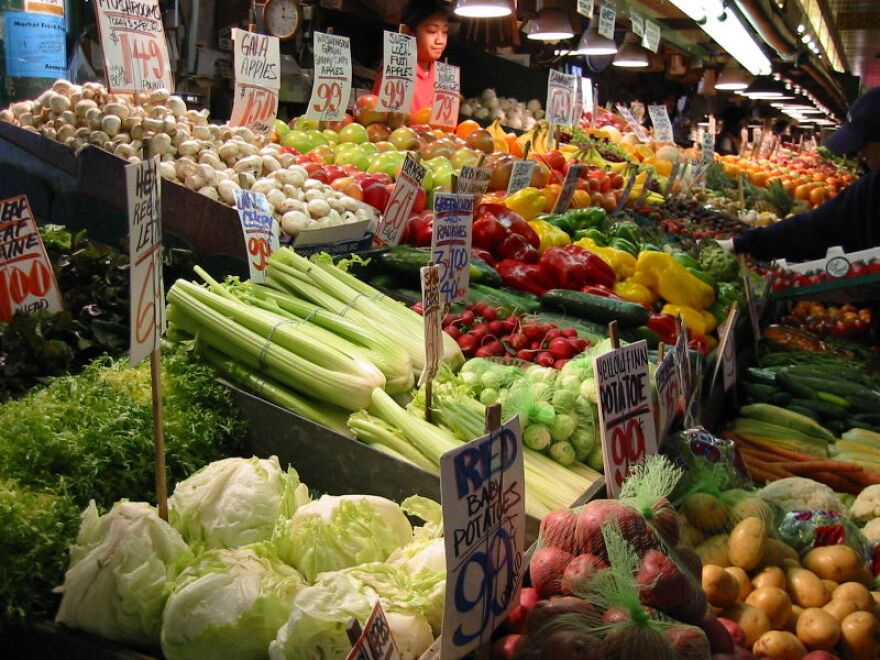Updated on July 20, 2018: A temporary solution will allow food stamp recipients to keep using SNAP benefits at farmers markets and food stands through the end of August. The funding comes from the National Association of Farmers Market Nutrition Programs. Our original reporting is below.
Now that summer is in full swing and farmers markets are abundant with fresh, local produce, the technology that enables people to use food stamps to buy that food faces a major snag.
For details we turn to Winton Pitcoff, who leads the Massachusetts Food System Collaborative.
Carrie Healy, NEPR: What happens in Massachusetts apparently hinges on the actions of a federal technology vendor. What's going on?
Winton Pitcoff: Yeah, it’s very complex, as it is going to involve the federal government and the state government. The Healthy Incentives Program and its operation depends upon integration with the EBT [electronic banking transfer] system. Because it's part of the federal system, there’s a lot of safeguards to avoid fraud.
There are several layers of technology between the USDA that actually administers the SNAP program [Supplemental Nutrition Assistance Program] and the customers themselves. And many of those are private companies.
So what we're dealing with now is a private company that built an excellent application to be used explicitly at farmers markets and farm stands -- and the company that built it is going out of business, and just let folks know about two or three weeks ago.
As a result, the majority of farms in the state that accept SNAP and HIP aren’t going to be able to use this software or this terminal anymore.
There are 243 of these terminals in Massachusetts that last year processed over $2.6 million in SNAP purchases. Also important to the farmers is that this same terminal can process credit and debit cards, and that’s another $600,000 worth of transactions from last year.
So without this tool, it's going to be real problematic for farmers and for customers starting on August 1.
So this interruption in service is going to compromise the entire range of programs that have kind of emerged in recent years to address low-income access to fresh, local food. This includes the Healthy Incentives Program, one that you and I talked about a few months ago, that faced a funding challenge. How far back will that set the HIP program?
Massachusetts has been at the forefront in the country for giving low-income families better access to fresh, healthy local food, both in terms of SNAP and now in terms of the Healthy Incentives Program, that’s really brought more folks out to the farmers markets than ever before.
The Healthy Incentives Program was tremendously successful, far beyond what anyone had predicted, and it’s entirely dependent upon this service.
There are a few farm stands and places that have landline terminals that will still be able to process HIP, but the vast majority of farms and farmers markets that are currently able to accept HIP won't be able to if Mobile Market Plus and the company that runs it go out of business on July 31.
So this fix is much larger than just Massachusetts. What are farmers, who are presumably nearing peak harvest season, supposed to do? What are consumers going to do?
That's right. Nationally, there’s 1,700 of these terminals around the country. Massachusetts processed more SNAP purchases than any other state last year and is on a similar pace this year. But farmers and customers all over the country are going to be deeply affected by this.
There are some very clunky workarounds that can be done by farmers -- there is always the option of purchasing new equipment, although that's very expensive. But none of those solutions work for HIP. The only solution for HIP is to keep the Mobile Market Plus operating.
There's still a lot being done to try to head off this problem, and USDA is working hard to try to come up with a solution that would allow for continuing operation of the system after July 31.
I don't know anything more than that, other than they tell us they are working on it. We’re getting down to the wire, and hoping that they do come up with some sort of a solution. If they don't, folks who use HIP have until July 31 to earn their July HIP incentive.
A lot of farms still do take SNAP, and that's one good thing about the HIP program. It really increased the number of farms in the state that are accepting SNAP. So, a lot of farms and markets will still take SNAP, but they won't be able to process the HIP incentives.






